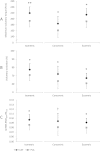Caffeine-induced increase in voluntary activation and strength of the quadriceps muscle during isometric, concentric and eccentric contractions
- PMID: 25969895
- PMCID: PMC4429543
- DOI: 10.1038/srep10209
Caffeine-induced increase in voluntary activation and strength of the quadriceps muscle during isometric, concentric and eccentric contractions
Abstract
This study investigated effects of caffeine ingestion (8 mg/kg) on maximum voluntary torque (MVT) and voluntary activation of the quadriceps during isometric, concentric and eccentric contractions. Fourteen subjects ingested caffeine and placebo in a randomized, controlled, counterbalanced, double-blind crossover design. Neuromuscular tests were performed before and 1 h after oral caffeine and placebo intake. MVTs were measured and the interpolated twitch technique was applied during isometric, concentric and eccentric contractions to assess voluntary activation. Furthermore, normalized root mean square of the EMG signal was calculated and evoked spinal reflex responses (H-reflex evoked at rest and during weak isometric voluntary contraction) as well as twitch torques were analyzed. Caffeine increased MVT by 26.4 N m (95%CI: 9.3-43.5 N m, P = 0.004), 22.5 N m (95%CI: 3.1-42.0 N m, P = 0.025) and 22.5 N m (95%CI: 2.2-42.7 N m, P = 0.032) for isometric, concentric and eccentric contractions. Strength enhancements were associated with increases in voluntary activation. Explosive voluntary strength and voluntary activation at the onset of contraction were significantly increased following caffeine ingestion. Changes in spinal reflex responses and at the muscle level were not observed. Data suggest that caffeine ingestion induced an acute increase in voluntary activation that was responsible for the increased strength regardless of the contraction mode.
Figures



Similar articles
-
Plyometric training improves voluntary activation and strength during isometric, concentric and eccentric contractions.J Sci Med Sport. 2016 Feb;19(2):170-6. doi: 10.1016/j.jsams.2015.01.011. Epub 2015 Feb 4. J Sci Med Sport. 2016. PMID: 25766509 Clinical Trial.
-
Alteration in neuromuscular function of the plantar flexors following caffeine ingestion.Scand J Med Sci Sports. 2015 Feb;25(1):e50-8. doi: 10.1111/sms.12243. Epub 2014 May 6. Scand J Med Sci Sports. 2015. PMID: 24798789 Clinical Trial.
-
Small Beneficial Effect of Caffeinated Energy Drink Ingestion on Strength.J Strength Cond Res. 2016 Jul;30(7):1862-70. doi: 10.1519/JSC.0000000000001289. J Strength Cond Res. 2016. PMID: 26670991 Clinical Trial.
-
The influence of caffeine on voluntary muscle activation.Med Sci Sports Exerc. 2005 Dec;37(12):2113-9. doi: 10.1249/01.mss.0000178219.18086.9e. Med Sci Sports Exerc. 2005. PMID: 16331138 Review.
-
Effects of caffeine on isometric handgrip strength: A meta-analysis.Clin Nutr ESPEN. 2022 Feb;47:89-95. doi: 10.1016/j.clnesp.2021.12.007. Epub 2021 Dec 14. Clin Nutr ESPEN. 2022. PMID: 35063247 Review.
Cited by
-
The Effects of High Doses of Caffeine on Maximal Strength and Muscular Endurance in Athletes Habituated to Caffeine.Nutrients. 2019 Aug 15;11(8):1912. doi: 10.3390/nu11081912. Nutrients. 2019. PMID: 31443220 Free PMC article. Clinical Trial.
-
Ischemic Preconditioning Did Not Affect Central and Peripheral Factors of Performance Fatigability After Submaximal Isometric Exercise.Front Physiol. 2020 Apr 28;11:371. doi: 10.3389/fphys.2020.00371. eCollection 2020. Front Physiol. 2020. PMID: 32411014 Free PMC article.
-
Acute Caffeine Intake Enhances Mean Power Output and Bar Velocity during the Bench Press Throw in Athletes Habituated to Caffeine.Nutrients. 2020 Feb 4;12(2):406. doi: 10.3390/nu12020406. Nutrients. 2020. PMID: 32033103 Free PMC article. Clinical Trial.
-
Acute effects of static balance exercise combined with different levels of blood flow restriction on motor performance fatigue as well as physiological and perceptual responses in young healthy males and females.Eur J Appl Physiol. 2024 Jan;124(1):227-243. doi: 10.1007/s00421-023-05258-5. Epub 2023 Jul 11. Eur J Appl Physiol. 2024. PMID: 37429967 Free PMC article.
-
Pre-Exercise Caffeine and Sodium Bicarbonate: Their Effects on Isometric Mid-Thigh Pull Performance in a Crossover, Double-Blind, Placebo-Controlled Study.Sports (Basel). 2024 Jul 29;12(8):206. doi: 10.3390/sports12080206. Sports (Basel). 2024. PMID: 39195582 Free PMC article.
References
-
- Harland B. F. Caffeine and nutrition. Nutrition. 16, 522–526 (2000). - PubMed
-
- Graham T. E., Hibbert E. & Sathasivam P. Metabolic and exercise endurance effects of coffee and caffeine ingestion. J. Appl. Physiol. 85, 883–889 (1998). - PubMed
-
- Burke L. M. Caffeine and sports performance. Appl. Physiol. Nutr. Metab. 33, 1319–1334 (2008). - PubMed
-
- Motl R. W., O’Connor P. J. & Dishman R. K. Effect of caffeine on perceptions of leg muscle pain during moderate intensity cycling exercise. J. Pain. 4, 316–321 (2003). - PubMed
MeSH terms
Substances
LinkOut - more resources
Full Text Sources
Other Literature Sources
Medical

